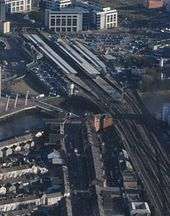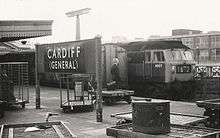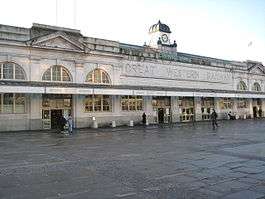Cardiff Central railway station
| Cardiff Central | |
|---|---|
| Welsh: Caerdydd Canolog | |
|
Frontage of Cardiff Central station (northern entrance) | |
| Location | |
| Place | Cardiff |
| Local authority | City and County of Cardiff |
| Coordinates | 51°28′32″N 3°10′41″W / 51.4755°N 3.1780°WCoordinates: 51°28′32″N 3°10′41″W / 51.4755°N 3.1780°W |
| Grid reference | ST181758 |
| Operations | |
| Station code | CDF |
| Managed by | Arriva Trains Wales |
| Owned by | Network Rail |
| Number of platforms | 7 |
| DfT category | A |
|
Live arrivals/departures, station information and onward connections from National Rail Enquiries | |
| Annual rail passenger usage* | |
| 2010/11 |
|
| – Interchange |
|
| 2011/12 |
|
| – Interchange |
|
| 2012/13 |
|
| – Interchange |
|
| 2013/14 |
|
| – Interchange |
|
| 2014/15 |
|
| – Interchange |
|
| History | |
| 19 June 1850 | Opened |
| 1932 | Rebuilt |
| National Rail – UK railway stations | |
| * Annual estimated passenger usage based on sales of tickets in stated financial year(s) which end or originate at Cardiff Central from Office of Rail and Road statistics. Methodology may vary year on year. | |
|
| |
| Railway lines in Cardiff | ||||||||||||||||||||||||||||||||||||||||||||||||||||||||||||||||||||||||||||||||||||||||||||||||||||||||||||||||||||||||||||||||||||||||||||||||||||||||||||||||||||||||||||||||||||||||||||||||||||||||||||||||||||||||||||||||||||||||||||||||||||||||||||||||||||||||||||||||||||||||||||||||||||||||||||||||||||||||||||||||||||||||||||||||||||||||||||||||||||||||||||
|---|---|---|---|---|---|---|---|---|---|---|---|---|---|---|---|---|---|---|---|---|---|---|---|---|---|---|---|---|---|---|---|---|---|---|---|---|---|---|---|---|---|---|---|---|---|---|---|---|---|---|---|---|---|---|---|---|---|---|---|---|---|---|---|---|---|---|---|---|---|---|---|---|---|---|---|---|---|---|---|---|---|---|---|---|---|---|---|---|---|---|---|---|---|---|---|---|---|---|---|---|---|---|---|---|---|---|---|---|---|---|---|---|---|---|---|---|---|---|---|---|---|---|---|---|---|---|---|---|---|---|---|---|---|---|---|---|---|---|---|---|---|---|---|---|---|---|---|---|---|---|---|---|---|---|---|---|---|---|---|---|---|---|---|---|---|---|---|---|---|---|---|---|---|---|---|---|---|---|---|---|---|---|---|---|---|---|---|---|---|---|---|---|---|---|---|---|---|---|---|---|---|---|---|---|---|---|---|---|---|---|---|---|---|---|---|---|---|---|---|---|---|---|---|---|---|---|---|---|---|---|---|---|---|---|---|---|---|---|---|---|---|---|---|---|---|---|---|---|---|---|---|---|---|---|---|---|---|---|---|---|---|---|---|---|---|---|---|---|---|---|---|---|---|---|---|---|---|---|---|---|---|---|---|---|---|---|---|---|---|---|---|---|---|---|---|---|---|---|---|---|---|---|---|---|---|---|---|---|---|---|---|---|---|---|---|---|---|---|---|---|---|---|---|---|---|---|---|---|---|---|---|---|---|---|---|---|---|---|---|---|---|---|---|---|---|---|---|---|---|---|---|---|---|---|---|---|---|---|---|---|---|---|---|---|
Legend | ||||||||||||||||||||||||||||||||||||||||||||||||||||||||||||||||||||||||||||||||||||||||||||||||||||||||||||||||||||||||||||||||||||||||||||||||||||||||||||||||||||||||||||||||||||||||||||||||||||||||||||||||||||||||||||||||||||||||||||||||||||||||||||||||||||||||||||||||||||||||||||||||||||||||||||||||||||||||||||||||||||||||||||||||||||||||||||||||||||||||||||
| ||||||||||||||||||||||||||||||||||||||||||||||||||||||||||||||||||||||||||||||||||||||||||||||||||||||||||||||||||||||||||||||||||||||||||||||||||||||||||||||||||||||||||||||||||||||||||||||||||||||||||||||||||||||||||||||||||||||||||||||||||||||||||||||||||||||||||||||||||||||||||||||||||||||||||||||||||||||||||||||||||||||||||||||||||||||||||||||||||||||||||||
Cardiff Central railway station (Welsh: Caerdydd Canolog) is a major railway station on the South Wales Main Line in Cardiff, United Kingdom and one of two hubs of the city's urban rail network.
It is the largest and busiest station in Wales and one of the major stations of the British rail network, the eleventh busiest station in the United Kingdom outside London (29th busiest overall), based on 2009/10 total entries and exits.[1]
It is located near the Millennium Stadium in the city centre and is one of 20 railway stations in the city and one of two in the city centre, the other being Cardiff Queen Street, both of which are hubs for the Valley Lines urban rail network, with several lines in Cardiff and the surrounding valleys.
Cardiff Central is a Grade II listed building managed by Arriva Trains Wales. It is an interchange between the rest of South and West Wales, and other major British cities. Arriva Trains Wales operate services to West Wales, Holyhead, Crewe and Manchester, as well as the South Wales Valley Lines. Great Western Railway runs intercity services to Bristol and London, and regional services to Bath, Taunton, Southampton and Portsmouth, whilst CrossCountry operates trains to Gloucester, Birmingham, Nottingham and Manchester.
History
.jpg)
In the early 1840s the South Wales Railway was trying to find a suitable site for a railway station, but the area that is now Cardiff Central railway station was prone to flooding. It was Isambard Kingdom Brunel's solution to divert the River Taff to the west, creating a larger and safer site for the station.[2] The initial part of the South Wales Railway between Chepstow and Swansea through Cardiff was opened on 18 June 1850, with all trains operated by the Great Western Railway (GWR) under a lease agreement.[3]
Between 1932 and 1934, the GWR replaced the original station building (also designed by their architects department) with an impressive new Art Deco building faced in Portland stone, enclosing including a booking hall with noted Art Deco light fittings, all topped by a clock cupola.[4] The Great Western Railway has its full name carved onto the façade (larger than the name of the station). As a result of representations by the GWR, a nearby working-class district, Temperance Town, was cleared during the late 1930s in order to improve the outlook of the rebuilt station.[5]
The formerly separate Cardiff Riverside suburban station of 1893 was integrated into the main station in 1940 but its platforms ceased to be used for passenger traffic in the 1960s.[6]
Initially named Cardiff, the station was renamed Cardiff General in July 1924 and Cardiff Central in May 1973.[7][8]
The station, its entrances and platforms, are Grade II listed.[9]
Station layout
There are two entrances to the station. The northern main entrance leads to the main concourse and is on Central Square, the plaza that accommodates Cardiff Central bus station,[10] a multi-storey car park and two main city centre taxi ranks. Three main city centre landmarks are visible from here: the Millennium Stadium, Stadium House and Southgate House.[11]
The southern entrance is at the rear of the station on Tresillian Way, accessed from St. Mary Street, where the station car park is found.
The railway lines are above the station's concourses. Two subways, one each at the eastern and western side of the station, run parallel under the tracks linking the two main entrances, from which the platforms are accessed by stairs and lifts, with the exception of Platform 0 which is accessed from the main concourse near Marks and Spencer. A valid ticket is required to pass through a barrier and gain access to the platforms.
Facilities
The majority of facilities are in the main concourse, including ticket desks and machines, cash machines, an information desk, LED departures and arrivals screens, public telephones, a newsagent, and food shops. The station has the only First Class waiting room in Wales.[12][13] Outside, an NCP pay-and-display car park provides 248 spaces.[14]
Security
British Transport Police maintains a presence at Cardiff Central.[15] In December 2009, the force announced a three-month pilot scheme to arm officers at the station, as well as in London and Manchester, with stun guns.[16]
Platforms

Cardiff Central has seven platforms, numbered 0, 1, 2, 3a/b, 4a/b, 6 and 7. There is no longer, despite signage, a Platform 5; this was a west-facing bay platform situated between Platforms 3 and 4.[17]
Platforms 3 and 4 are divided into 'A' and 'B' sections and are capable of holding two local trains or a single HST train. Other platforms can be used by more than one train, but are not sectioned.
Platform 6 is used by Valley Lines trains to the north and east of Cardiff and to the Valleys. Every train from Platform 6 calls at Cardiff Queen Street. Valley Line trains from Cardiff Queen Street call at Platform 7 and continue to north-west Cardiff and the Vale of Glamorgan.
The normal pattern of usage is:
- Platform 0
- Platform 1
- CrossCountry:
- Nottingham via Birmingham New Street and Derby, usually Class 170 'Turbostar' units
- Arriva Trains Wales:
- Cheltenham Spa via Gloucester, usually Class 158 or Class 150 'Sprinter' units from Maesteg.
- Terminating trains from Swansea, Carmarthen and Milford Haven
- Great Western Railway:
- London Paddington via Bristol Parkway, Swindon and Reading, usually High Speed Trains from Swansea
- CrossCountry:
- Platform 2
- Arriva Trains Wales:
- Cheltenham Spa via Gloucester, usually Class 158 or Class 150 'Sprinter' units from Maesteg One service starts from Fishguard Harbour
- Holyhead via Newport, Hereford, Shrewsbury, Wrexham General, Chester, Llandudno Junction and Bangor, usually Class 175 'Coradia' units
- Manchester Piccadilly via Newport, Hereford, Shrewsbury and Crewe, usually Class 175 'Coradia' units from Carmarthen or Milford Haven, with one from Fishguard Harbour
- Great Western Railway:
- Taunton via Bristol Temple Meads and Weston-super-Mare, usually Class 150 'Sprinter' units and Class 158 'Express Sprinter' units. Some of these trains were operated by Class 67 and Class 57 locomotives with four Mk2 coaches for a time.
- Portsmouth Harbour via Bristol Temple Meads, Bath Spa, Westbury, Salisbury, Southampton Central, Fareham, Cosham, Fratton and Portsmouth and Southsea
- CrossCountry:
- Arriva Trains Wales:
- Platforms 3a/3b
- Arriva Trains Wales:
- Milford Haven/Carmarthen via Bridgend and Swansea, usually Coradia units from Manchester Piccadilly
- Great Western Railway:
- Swansea via Bridgend, Port Talbot Parkway and Neath, usually High Speed Trains from London Paddington
- Arriva Trains Wales:
- Platform 4a/4b
- Arriva Trains Wales:
- Fishguard Harbour (two via Swansea and Carmarthen, plus one fast service avoiding both).
- Maesteg via Pontyclun and Bridgend, usually Class 158 or Class 150 'Sprinter' units from Cheltenham Spa.
- Great Western Railway
- Terminating trains from London Paddington, Taunton, Westbury and Portsmouth Harbour
- CrossCountry
- Terminating trains from Nottingham, Birmingham New Street and Manchester Piccadilly.
- Arriva Trains Wales:
- Platform 6
- Arriva Trains Wales:
- Coryton via Cardiff Queen Street, Heath Low Level, Ty Glas, Birchgrove, Rhiwbina and Whitchurch
- Bargoed via Cardiff Queen Street, Caerphilly and Ystrad Mynach
- Rhymney via Cardiff Queen Street, Ystrad Mynach, Bargoed and Tir-Phil
- Merthyr Tydfil via Cardiff Queen Street, Radyr, Pontypridd, Abercynon and Quakers Yard
- Aberdare via Cardiff Queen Street, Radyr, Pontypridd, Abercynon and Mountain Ash
- Treherbert via Cardiff Queen Street, Radyr, Pontypridd, Tonypandy, Llwynypia, Ystrad Rhondda, Ton Pentre, Treorchy and Ynyswen
- Terminating trains from Bridgend via the Vale of Glamorgan Line.
- Arriva Trains Wales:
- Platform 7
- Arriva Trains Wales:
- Radyr via Ninian Park, Waun-Gron Park, Fairwater and Danescourt
- Penarth via Grangetown and Dingle Road
- Barry Island via Grangetown, Dinas Powys and Barry
- Bridgend via Grangetown, Dinas Powys, Barry, Rhoose Cardiff International Airport and Llantwit Major
- Terminating trains from Treherbert
- Arriva Trains Wales:
Cardiff Central bus station
Cardiff Central bus station was located directly opposite the front of the railway station. It was the central point for all local and national bus services in Cardiff. It contained six covered ranks on the north side for most Cardiff Bus services and other services such as EST buses. Long-distance services to the valleys and coach services such as TrawsCambria and National Express departed from rank A at the north end. Stops either side of Wood Street, which runs alongside the main terminal, are still in use mainly for departures to Barry, Penarth, Cardiff Bay, Caerau, Ely and Tremorfa.
The bus station closed in 2015.
Regeneration
In 2011 it was announced that Cardiff Central would be enhanced with a new platform ('Platform 8') and a new two-storey southern entrance and booking hall. This was part of a £200m regeneration scheme to boost train capacity in Cardiff and the surrounding areas. Work is expected to start from June 2014. The Assembly Government has committed £7m for the overall enhancements programme[18]
The old Grade II listed Water Tower (next to Platform 0 and the River Taff) was repainted in 2012 in the original brown and beige colours of the Great Western railway.[19]
Central Square
Central Square is the large public space directly outside the main entrance to the station, including Cardiff bus station.
In 2010 hotel developer Urban Solutions promised £300,000 towards improvements towards the long term regeneration of Central Square. They also agreed to fund 12 cycle stands and the OYBike hire point outside Central Station.[20]
In 2012 another proposal was unveiled by Cardiff Council to sell-off the existing bus station land for redevelopment and invest some of the money in Central Square, to be renamed 'Capital Square'. An 80 metre long fountain was envisaged by the architecture firm, Stride Treglown, along with a 'Welsh Garden' reflecting the landscape of Wales.[21]
Gallery
-

Cardiff General in May 1970
-

A mosaic outside the station
-

The Concourse looking west
-

The Subway
-

The view from the eastern end of Platform 3 & 4
-

British Rail Class 47 The Queen Mother in ScotRail livery on Platform 4 in 1986
Routes
Rail & sea corridor to Ireland
Some of the Arriva Trains Wales boat trains to and from Fishguard Harbour commence at Cardiff Central. These connect with the Stena Line ferry to Rosslare Harbour in Ireland with a daily morning and evening service in both directions. This route has been in existence since 1906.
Incidents
To the east of the platforms, the Valley Lines tracks rise up and cross over the South Wales Main Line using a bridge. Rail services were severely disrupted in August 2012 when the retaining wall between the tracks partially collapsed, spilling five tonnes of earth. The South Wales Main Line was swiftly reopened, but all services between Cardiff Central and Cardiff Queen Street were cancelled, with a replacement bus service operating. It was expected that repairs could take two weeks.[22][23] There were worries that the bronze medal match in the 2012 Summer Olympics men's football competition, held at the nearby Cardiff Millennium Stadium could be disrupted, but most fans were due to arrive by the main line rather than the Valley Lines.[24] There had been severe congestion at the station earlier in the month due to another Olympic match.[25]
See also
- List of railway stations in Wales
- Transport in Wales
- Commuter rail in the United Kingdom
- Rail transport in Cardiff
Notes
- ↑ http://www.rail-reg.gov.uk/upload/pdf/stn_usage_report_0910.pdf
- ↑ "Cardiff Arms Park, A short History - The Creation of the Arms Park". Cardiff Council. Archived from the original on 15 October 2012. Retrieved 22 May 2008.
- ↑ MacDermot, E T (1927). History of the Great Western Railway, volume I 1833–1863. London: Great Western Railway.
- ↑ "Cardiff General Railway Station, Cardiff". Coflein. Royal Commission on the Ancient and Historical Monuments of Wales. Retrieved 1 April 2013.
- ↑ Fisk, Stephen (June 2009). "Abandoned Communities - Temperance Town". Retrieved 3 November 2009.
- ↑ Barrie, D.S.M. (1980). South Wales. Newton Abbot: David & Charles. ISBN 0-7153-7970-4.
- ↑ Butt, R.J.V. (1995). The Directory of Railway Stations. Patrick Stephens Ltd. p. 53.
- ↑ Cardiff Timeline Archived 29 September 2007 at the Wayback Machine.
- ↑ "Cardiff Central Station, Booking Hall, Passenger Subway, Platforms 1-4, 6 & 7 and Platform Buildings". British Listed Buildings. Retrieved 1 April 2013.
- ↑ Cardiff Central Railway Station
- ↑ cardiff central station view - Google Maps
- ↑ First Class - First Great Western
- ↑ First Class Lounges at Major Train Stations | Virgin Trains
- ↑ http://www.nationalrail.co.uk/stations_destinations/cdf.aspx
- ↑ British Transport Police, Wales & Western Area Archived 25 December 2013 at the Wayback Machine.
- ↑ Transport police to trial tasers on trains around Cardiff - Wales Online
- ↑ Potential reinstatement of this platform is mentioned on page 10 of Network Rail's route plan for the Valley Lines
- ↑ Peter Law, "Cardiff rail stations set for revamp", South Wales Echo, 9 February 2011.
- ↑ "Cardiff Central's landmark water tower renovation starts - without a daffodil in sight". Wales Online. 19 June 2012. Retrieved 5 January 2014.
- ↑ Abby Alford Hotel developer pledges £300k to spruce up Cardiff’s Central Square, South Wales Echo, 13 August 2010. Retrieved 15 November 2011.
- ↑ Peter Law, "Exciting Times" for Capital, South Wales Echo, 30 January 2012, pp. 4/5.
- ↑ "Cardiff rail disruption 'to continue' after wall breaks". BBC News. BBC. 11 August 2012. Retrieved 11 August 2012.
- ↑ "Cardiff rail services disruption after wall collapse". BBC News. BBC. 10 August 2012. Retrieved 11 August 2012.
- ↑ "Cardiff wall collapse causes rail delays". BBC News. BBC. 10 August 2012. Retrieved 11 August 2012.
- ↑ "Olympic football: Team GB Cardiff quarter-final attracts thousands". BBC News. BBC. 5 August 2012. Retrieved 11 August 2012.
Further reading
- "Cardiff plan". Rail Enthusiast. EMAP National Publications. October 1982. p. 52. ISSN 0262-561X. OCLC 49957965.
External links
![]() Media related to Cardiff Central railway station at Wikimedia Commons
Media related to Cardiff Central railway station at Wikimedia Commons


